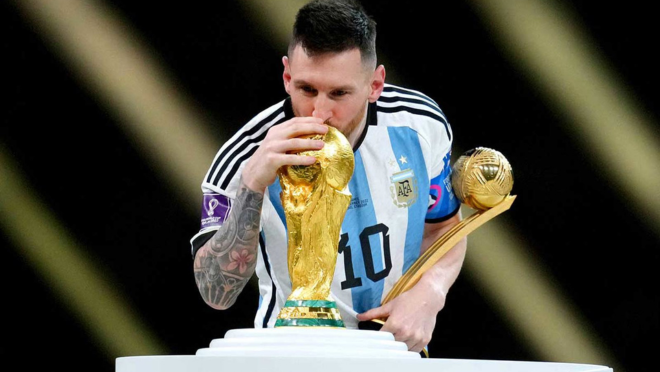Celebrating Lionel Messi’s 38th birthday: Inside the making of the GOAT
Celebrating Lionel Messi’s 38th birthday: Inside the making of the GOAT

This year on 24 June, Lionel Messi turns 38. For most professional footballers, this would be a time to look back—perhaps from the comfort of retirement or maybe from the sidelines as a coach. But Messi remains in the arena. He continues to play, to create, to lead. And in doing so, he reaffirms a truth that now feels obvious: we are watching the greatest footballer of all time.
To call someone the “GOAT”—the greatest of all time—is bold. In football, it’s contentious. The sport has no shortage of legends: Pele, Maradona, Zidane, Ronaldo (both of them). But Messi’s claim stands apart not because of one spectacular season or a single defining goal. It’s because of the quiet accumulation of excellence over two decades. His story is not about sudden genius. It’s about consistency, resilience, and evolution.
Messi’s story begins in Rosario, Argentina. As a child, he was quiet, often more comfortable with a ball than with people. By the age of eight, he was already showing signs of rare talent. But at eleven, he was diagnosed with a growth hormone deficiency—a condition that would stunt his physical development without expensive treatment. Local clubs admired his skills but couldn’t afford the cost of his medical care.
The turning point came in 2000, when FC Barcelona offered him a trial. Carles Rexach, the club’s then technical director, famously signed Messi on a paper napkin. It was not just an act of faith in a small, shy boy. It was a calculated risk on talent that, even at that age, looked unusual. Barcelona agreed to pay for his treatment, and Messi moved with his father to Spain. He was thirteen.
Messi’s rise through Barcelona’s academy, La Masia, was steady rather than explosive. Coaches noted his vision, balance, and control. By 17, he made his first-team debut. Within two years, he was a starter. What followed was an era of dominance.
Between 2004 and 2021, Messi played 778 matches for Barcelona. He scored 672 goals and assisted hundreds more. However, statistics only provide a partial picture. Messi changed how football looked. He played as a winger, a striker, a playmaker—all in one. He could dribble through defenders like water through fingers. He made passing an art form. And he did it all without theatrics. His genius was never loud; it was just always there.
Under coaches like Pep Guardiola, Messi thrived. The tiki-taka style—a fast, short-passing game—fit him perfectly. But even when systems changed, Messi adapted. His 91-goal calendar year in 2012 still stands as a record, but it wasn’t a spike in form. It was a peak in a mountain range of excellence.
For much of his career, Messi’s relationship with Argentina was complicated. Fans loved him, but many compared him—often unfavorably—to Diego Maradona. Maradona had delivered a World Cup. Messi hadn’t. Despite winning Olympic gold in 2008 and reaching three major finals with the national team, he was often criticised for not replicating his club success on the international stage.
That changed in 2021. Messi led Argentina to victory in the Copa América, their first major title in 28 years. It was a moment of release—for him and for the nation. He cried. So did millions of Argentinians. Then, in 2022, he did what once seemed impossible: he lifted the FIFA World Cup. At 35, in what was likely his last World Cup, Messi played some of the finest football of his life. He scored, assisted, led, and inspired. The GOAT debate ended there.
Messi’s greatness goes beyond skill. It lies in how he has carried himself. In an era of celebrity athletes, he has stayed remarkably private. He avoids controversy. He does not seek the spotlight off the pitch. While rivals chased brand deals and headlines, Messi focused on the game. This simplicity has made him relatable, even as his achievements remain unreachable.
He has faced challenges—legal issues, club tensions, the emotional exit from Barcelona—but always returned to the field with the same quiet focus. His time at Paris Saint-Germain was mixed, yet even there, he delivered moments of brilliance. Now at Inter Miami, he brings global attention to Major League Soccer, still scoring, still creating, still enjoying the game.
What Messi leaves behind is more than trophies or records. He has changed what we expect from a footballer. He has shown that greatness doesn’t need volume. It can be calm, composed, and kind. He has inspired a generation—not just to play, but to play with joy.
There will always be debates. Some will say Pele won three World Cups. Others will point to Maradona’s charisma or Cristiano Ronaldo’s physical dominance. But Messi’s case is built not on moments, but on a body of work. Twenty years at the top. No major scandal. No lost seasons. Just football, done at its highest level, again and again.
As Messi turns 38, he is still not done. But even if he were to hang up his boots tomorrow, the title would still hold. GOAT is a term used too often, but in Messi’s case, it fits. He earned it the hard way—one game at a time.


